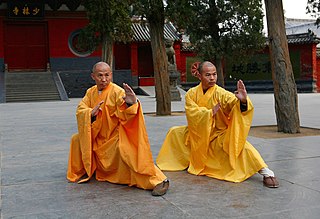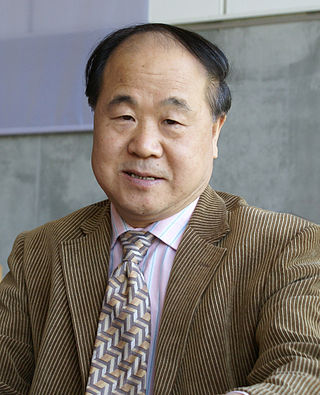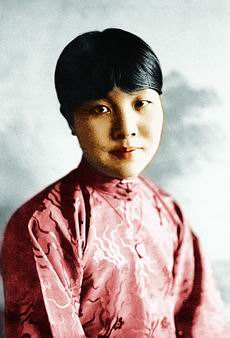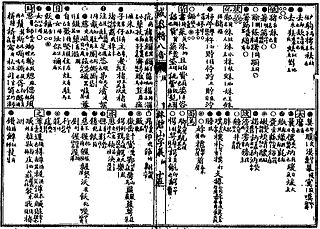
Shen Dehong, best known by the pen name of Mao Dun, was a Chinese novelist, essayist, journalist, playwright, literary and cultural critic. He was highly celebrated for his realist novels, including Midnight, which depicts life in cosmopolitan Shanghai. Mao was one of the founders of the Chinese Communist Party and participated in a number of left-wing cultural movements during the 1920s and 1930s. He was the editor-in-chief of Fiction Monthly and helped lead the League of Left-Wing Writers. He formed a strong friendship with fellow left-wing Chinese author Lu Xun. From 1949 to 1965, Mao served as the first Minister of Culture in the People's Republic of China.

Fujian is a province on the southeastern coast of China. Fujian is bordered by Zhejiang to the north, Jiangxi to the west, Guangdong to the south, and the Taiwan Strait to the east. Its capital is Fuzhou and its largest city by population is Quanzhou, other notable cities include the port city of Xiamen and Zhangzhou. Fujian is located on the west coast of the Taiwan Strait as the closest geographically and culturally to Taiwan. Certain islands such as Kinmen are only approximately 10kms east of Xiamen in Fujian.

Fuzhou, alternately romanized as Foochow, is the capital and one of the largest cities in Fujian province, China. Fuzhou lies between the Min River estuary to the south and the city of Ningde to the north. Together, Fuzhou and Ningde make up the Mindong linguistic and cultural region.

Dog Kung Fu, i.e. Gǒuquán (狗拳), i.e. Dìshùquán (地术拳), is a martial arts style native to Fujian province China. While sharing many similar features to styles like Wuzuquan, Huzunquan, and many others from the same region, this southern style of Chinese boxing has the unique feature of specializing in takedowns, Chin Na, and ground fighting while often taking advantage of utilizing techniques from an inferior position. This martial art also teaches Iron Shirt and Iron Palm fighting methods as well as specialized leaping techniques. Its creation is traditionally credited to a Buddhist nun who developed the style to defend herself from bandits on her travels.

Guan Moye, better known by the pen name Mo Yan, is a Chinese novelist and short story writer. Donald Morrison of U.S. news magazine TIME referred to him as "one of the most famous, oft-banned and widely pirated of all Chinese writers", and Jim Leach called him the Chinese answer to Franz Kafka or Joseph Heller. In 2012, Mo was awarded the Nobel Prize in Literature for his work as a writer "who with hallucinatory realism merges folk tales, history and the contemporary".

Wang Xiaobo was a renowned contemporary Chinese novelist and essayist from Beijing.

Xie Wanying, better known by her pen name Bing Xin or Xie Bingxin, was one of the most prolific Chinese women writers of the 20th century. Many of her works were written for young readers. She was the chairperson of the China Federation of Literary and Art Circles. Her pen name Bing Xin carries the meaning of a morally pure heart, and is taken from a line in a Tang dynasty poem by Wang Changling.

Lin Shu (Chinese: 林紓, November 8, 1852 – October 9, 1924; courtesy name Qinnan was a Chinese man of letters, especially for introducing Western literature to a whole generation of Chinese readers, despite his ignorance of any foreign languages. Collaborating with others, he translated from English or French into Literary Chinese over 180 works, mostly novels, drawn from 98 writers of 11 countries.

The Fuzhou dialect, also Foochow, Hokchew, Hok-chiu, or Fuzhounese, is the prestige variety of the Eastern Min branch of Min Chinese spoken mainly in the Mindong region of Eastern Fujian Province. As it is mutually unintelligible to neighbouring varieties in the province, under a technical linguistic definition Fuzhou is a language and not a dialect. Thus, while Fuzhou may be commonly referred to as a 'dialect' by laypersons, this is colloquial usage and not recognised in academic linguistics. Like many other varieties of Chinese, the Fuzhou dialect is dominated by monosyllabic morphemes that carry lexical tones, and has a mainly analytic syntax. While the Eastern Min branch it belongs to is relatively closer to other branches of Min such as Southern Min or Pu-Xian Min than to other Sinitic branches such as Mandarin, Wu Chinese or Hakka, they are still not mutually intelligible.

Tong Zhonggui, known by the pen name of Su Tong is a Chinese writer. He was born in Suzhou and lives in Nanjing.
Wang Anyi is a Chinese writer, vice-chair of the China Writers Association since 2006, and professor in Chinese Literature at Fudan University since 2004.

The Qi Lin Bayin, sometimes translated as Book of Eight Sounds or Book of Eight Tones, is a Chinese rime book of approximately ten thousand characters based on the earlier form of the Fuzhou dialect. First compiled in the 17th century, it is the pioneering work of all written sources for Min languages, and is widely quoted in modern academic research in Chinese phonology.

Wang Wen-hsing was a Taiwanese writer.
Zhu Wen is a Chinese short story writer turned director.

Fuzhou people, also known as, Foochowese, Hokchew, Hokchia, Hokchiu, Fuzhou Shiyi people (福州十邑人), Eastern Min or Mindong are residents of either Fuzhou and Mindong regions and the Gutian and Pingnan counties of Fujian province and Matsu Islands in Taiwan. Fuzhou people are a part of the Min Chinese-speaking group that speaks Eastern Min or specifically Fuzhou dialect. There is also a significant overseas Fuzhou population, particularly distributed in Malaysia, Indonesia, Japan, United States, Singapore and the United Kingdom.
Chinese science fiction is genre of literature that concerns itself with hypothetical future social and technological developments in the Sinosphere.
Lu Wenfu(Chinese: 陆文夫, March 23, 1927 - July 9, 2005) was a contemporary Chinese writer. He was interested in literature from an early age and devoted all his life to it. He worked for many years as journalist and a magazine editor and served as president of the Jiangsu Writers' Association and vice president of the Chinese Writers' Association. Lu's life ended in Suzhou, his favorite city in Jiangsu province. All his work is a mirror of this old city and that's why his novels are generally regarded as Suzhou literature. He is famous for his first story Deep within a Lane (小巷深处). From then on, Lu started producing a lot of fictions and essays.
Deng Xiaohua, better known by her pen name Can Xue, is a Chinese avant-garde fiction writer and literary critic. Her family was severely persecuted following her father being labeled a rightist in the Anti-Rightist Campaign of 1957. Her writing, which consists mostly of short fiction, breaks with the realism of earlier modern Chinese writers. She has also written novels, novellas, and literary criticism of Dante, Jorge Luis Borges, and Franz Kafka. Can Xue has been described as "China’s most prominent author of experimental fiction," and most of her fiction has been translated and published in English.

Hu Yepin was a Chinese writer, poet, and playwright. Hu was a member of the League of Left-Wing Writers and was executed in February 1931 by the Kuomintang government along with other writers such as Li Weisen.
Fuzhounese Americans, also known as Hokchew Americans or Fuzhou Americans or imprecisely Fujianese, are Chinese American people of Fuzhou descent, in particular from the Changle district. Many Chinese restaurant workers in the United States are from Fuzhou. There are also a number of undocumented Fuzhounese immigrants in the United States who are smuggled in by groups such as snakeheads.













